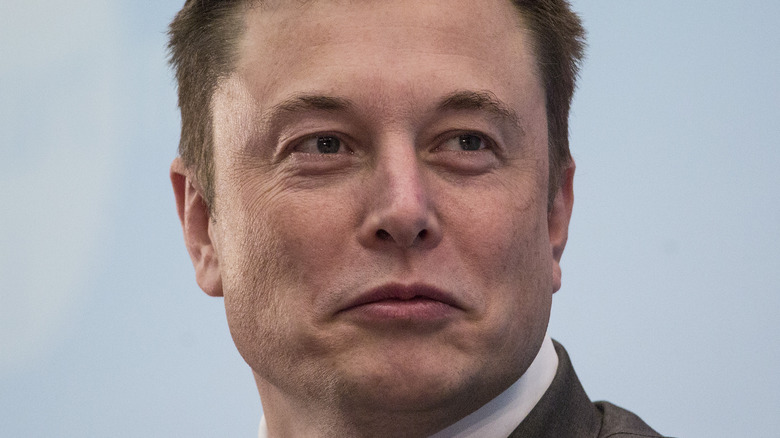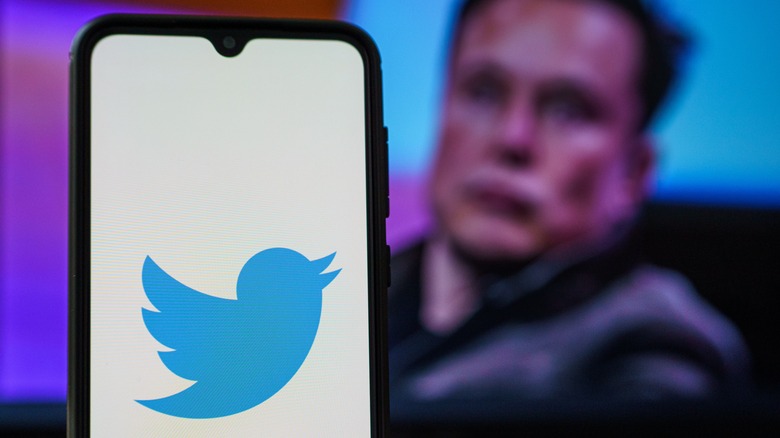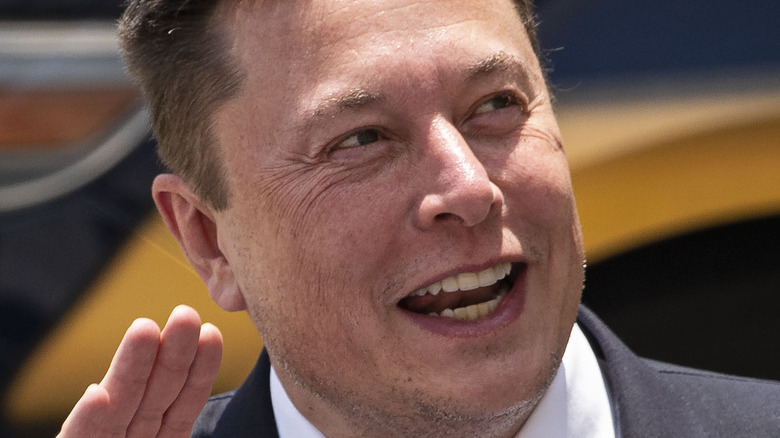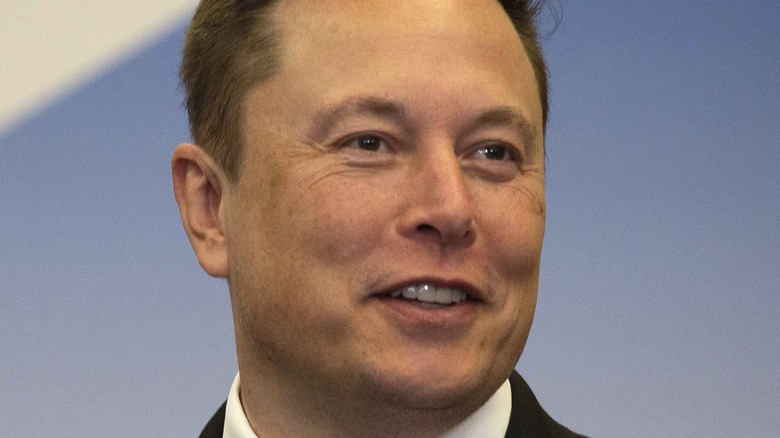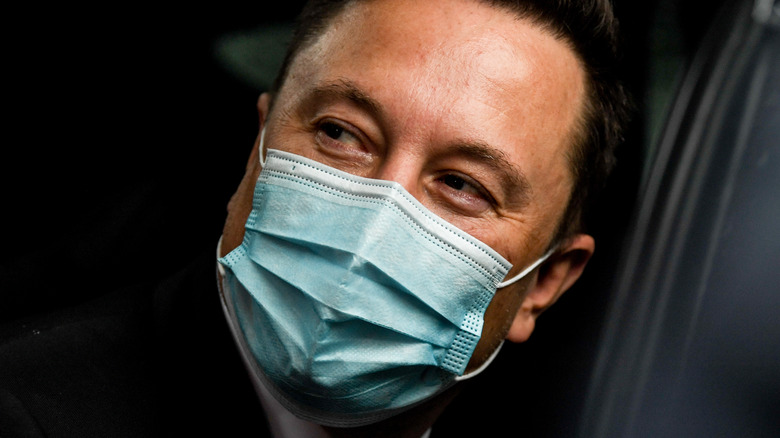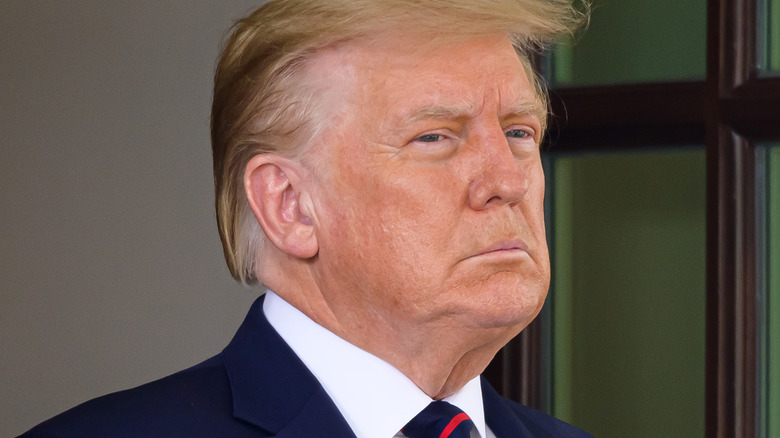Inside Elon Musk's Relationship With Donald Trump
Everyone has been glued to Elon Musk's Twitter feed this week after he made an offer to buy the social media giant. Already the platform's largest shareholder, owning 9.2 percent of the company's stock, according to Newsweek, Musk made an offer to buy the company outright with the intention of rehabilitating Twitter's image.
In a letter sent to Twitter board Chairman Bret Taylor with his offer to buy the company, Musk explained his motivations and vision for the social media app. "I invested in Twitter as I believe in its potential to be the platform for free speech around the globe," he wrote, "and I believe free speech is a societal imperative for a functioning democracy" (via CNBC).
Many see Musk's stance on free speech as a sign that former President Donald Trump could be welcomed back to Twitter. According to The Washington Post, Twitter sent an open letter to its employees this week promising employees that Musk wouldn't be making changes to the rules, reassuring them that fighting "hate speech and trolls" was more important to them "than any board member."
But Trump supporters are still optimistic about Musk inviting former President Trump back onto Twitter, especially with the continued failure of Truth Social. After all, the success of Trump's social media platform isn't what you think it is. Still, some believe that because of Musk's and Trump's perceived relationship, the question isn't if Trump will return to Twitter, but when.
How Elon Musk responded to Donald Trump's Twitter ban
Former President Donald Trump was banned from Twitter permanently on January 8, 2021, for inciting violence following the January 6 Capitol Hill riot. In a statement, Twitter explained that Trump's tweets, as well as how they were received by the public both on and off of the platform, had been analyzed. Allowing him to stay on Twitter, they argued, ran the risk of inciting more violence.
Elon Musk didn't outright condemn Twitter for banning Trump when it happened. He did point out, however, that "[a] lot of people are going to be super unhappy with West Coast high tech as the de facto arbiter of free speech." It's a sentiment that Musk repeated during a Ted Talk on April 14, 2022, Fortune reports. "Twitter has become the de facto town square," Musk said. "It's important people have the reality and the perception that they're able to speak freely within the bounds of the wall." He also said he felt suspensions were better than permanent bans, explaining that an important part of free speech was that people you don't like still being "allowed to say something you don't like."
But just because he believes in free speech, doesn't mean Musk is a supporter of Trump's, or would be willing to lift Trump's permanent Twitter ban.
Elon Musk is not a Republican
If Elon Musk has to get political, he says that it's only when it'll benefit his company, per Inverse. But when Musk agreed to join former President Donald Trump's Strategic and Policy advisory committee when he was preparing to take office, many assumed Musk was a Trump supporter — or a republican at the very least (via Newsweek).
Musk faced major backlash on social media for working with the president-elect, even on just an advisory level. The involvement itself is seen as Musk's endorsement of Trump and his agenda. But what Musk was after was the opportunity to influence Trump. "People should push to have as many moderates advising the President as possible," Musk said in response to criticism, per Newsweek. "Blind hate is never the right answer."
In fact, Musk claims he goes out of his way to avoid wading into politics. Newsweek reports the Tesla founder has donated to candidates from both major political parties and, when he was living in California, was a registered independent who described his own views as "moderate." The only presidential candidate Musk has openly endorsed to date has been Andrew Yang, a democrat who shares Musk's feelings on "universal basic income in an increasingly automated society," per Politico.
Elon Musk and Donald Trump don't agree on climate change
Just days before former President Donald Trump was elected, Elon Musk was asked what he thought about then-presidential nominees Hillary Clinton and Trump. "Obviously I think Hillary's ... environmental politics, in particular, are the right ones," he explained during an interview on MSNBC's Squawk Alley. Overall, though, he didn't feel the 2016 election was "the finest moment in our democracy in general" and didn't believe Trump had "the sort of character that reflects well on the United States" (via Inverse).
After Trump won the election, Musk still agreed to work with him, hoping to influence the president. In a direct message with the Gizmodo Twitter account, Musk explained that "the more voices of reason that the President hears, the better. Simply attacking him will achieve nothing." He then added, "Better that there are open channels of communication" (via Inverse).
But when Trump pulled the United States out of the Paris Climate Accord in June 2017, Musk took a firm stance against Trump. "Climate change is real," Musk tweeted. "Leaving Paris is not good for America or the world." In an interview with Rolling Stone in November 2017, Musk explained he felt that "[c]limate change is the biggest threat that humanity faces this century" and that he started Tesla to "accelerate the advent of sustainable energy. That's why I open-sourced the patents," he said. "It's the only way to transition to sustainable energy better."
Elon Musk and Donald Trump bonded over their views on Covid-19
Where it's clear Elon Musk and former President Donald Trump align publicly is their view on COVID-19.
In May 2020, when Alameda County in California shut down because of rising COVID-19 cases and deaths, Musk defied orders to close the Tesla plant in Fremont. This drew public support from Trump, who took to Twitter to demand California let Musk re-open his plant. "It can be done Fast & Safely," Trump tweeted, per The Washington Post.
This was after Musk had been on a call with other CEOs and the former president where the topic had been about how to get the companies open and people back to work. Sources told The Washington Post that Musk had been praising the president on the call and that the president agreed with Musk about there being no "significant risk" in re-opening businesses and factories.
What Musk has in common with many Trump supporters, and perhaps Trump himself, is that he is against mandates. He doesn't believe the government should be telling its citizens that they need vaccinations, that they should close their businesses, or that people should wear masks. "Frankly, I would call it forcible imprisoning of people in their homes against all of their constitutional rights, in my opinion," Musk reportedly said on a Tesla call, per The Daily Beast.
He and Trump also believe in vaccinations. During an interview with TIME, Musk said he and his family had been vaccinated. "The science," Musk explained, "is unequivocal."
Here's what Donald Trump thinks of Elon Musk
When it comes to Elon Musk, former President Donald Trump is a big fan. In an interview with CNBC, Donald said Musk was "one of our great geniuses" who had to be protected. "He's one of our very smart people," the then-president added, "and we want to cherish those people."
The former president isn't the only Donald who is a fan of Elon. When Elon tweeted "take the red pill" with a red rose emoji, Ivanka Trump retweeted it, adding, "Taken!" This is a reference to "The Matrix," whose main character takes a red pill to see what the world around him really is. The phrase has been co-opted by conservative groups, however, who use it instead to announce when someone has awoken to the believed merits of their causes, per Business Insider.
Still, in an interview with The New York Times, Elon said Ivanka and other Donald supporters had taken the tweet too politically. "Accept reality as it is as opposed to what you wish it were," he clarified. "I think [Ivanka] was interpreting it through more of a political lens than it was intended."
This is exactly how most of Elon's actions are analyzed through: a political one. But Elon has repeatedly shown and explained that his actions are motivated by business. He'll be nice to whoever he has to if it means he has a chance at influencing the conversation in a direction that benefits his interests. Nevertheless, the former president and the Tesla CEO have a lot in common. China has called Elon out, and Donald has always held issues with the country. For now, we can only wait to see how their relationship evolves.
